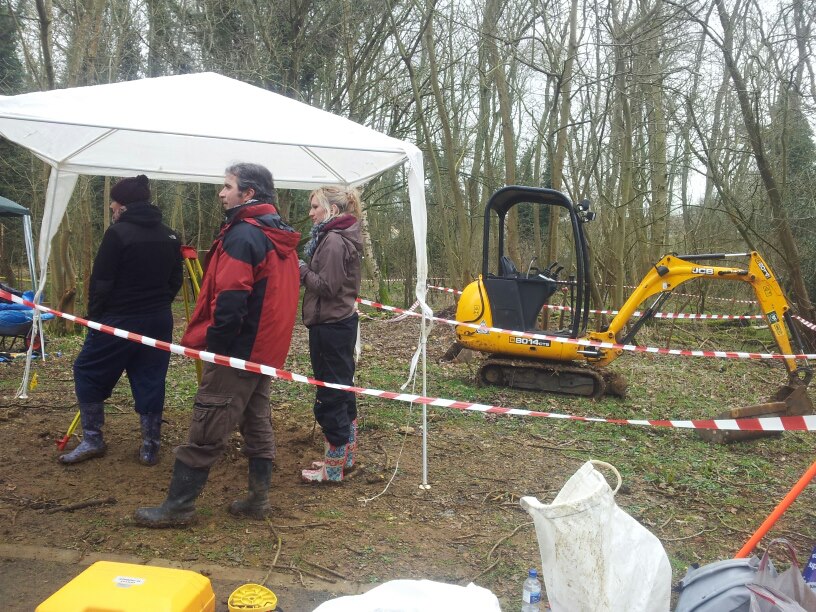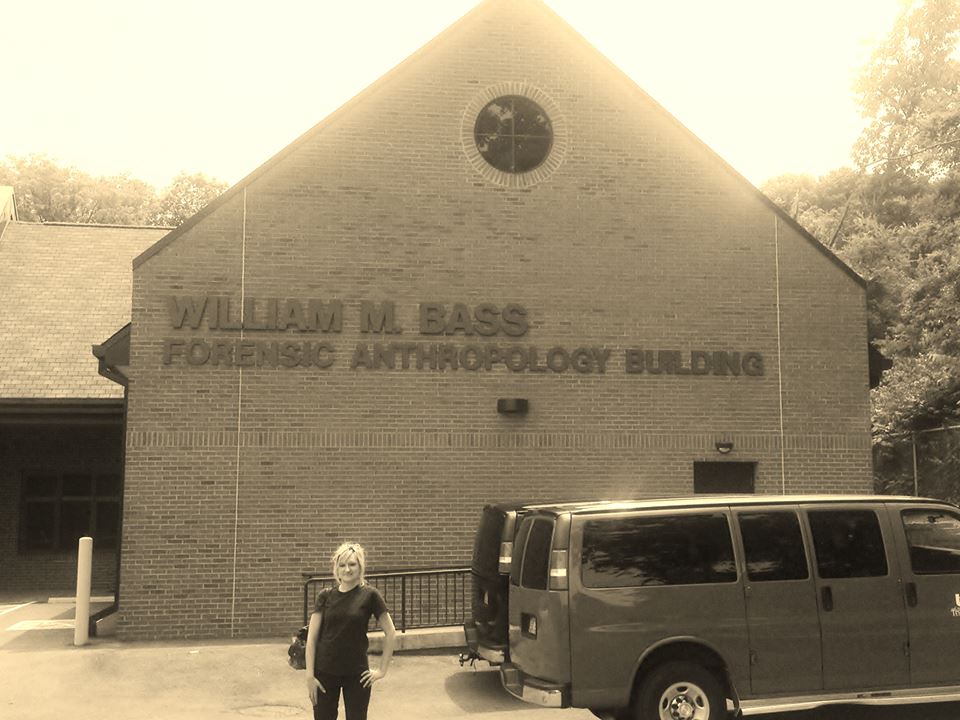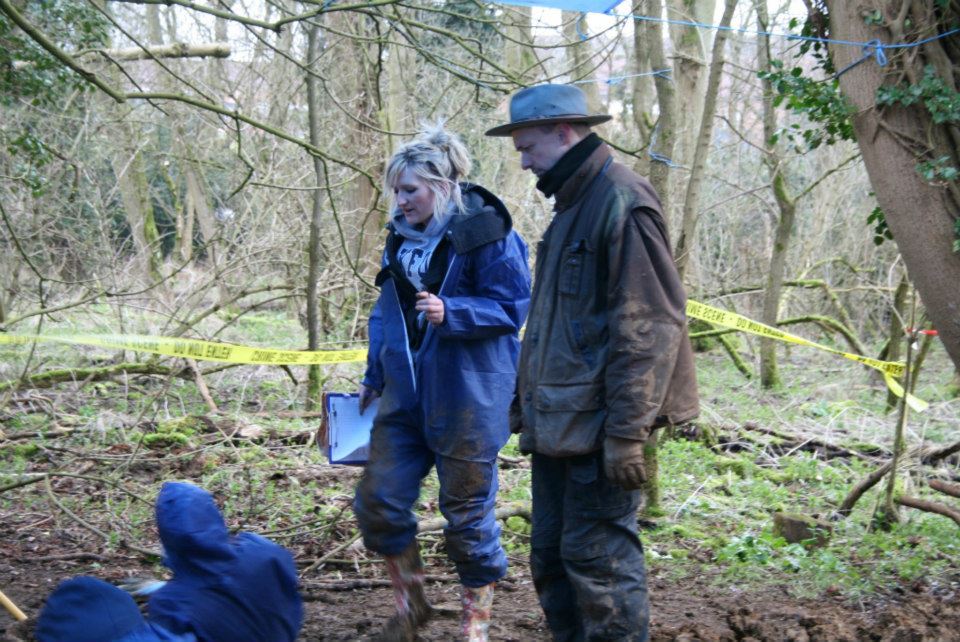Being a real life crime scene investigator: Blog 2 – Studying at Cranfield
31/01/2019

Studying the Forensic MSc Programme full-time at Cranfield University provided me with a valuable stepping stone to pursue a career in the forensic field. I elected for the MSc Forensic Archaeology and Anthropology degree as this unique combination enabled me to acquire knowledge in both specialisms whilst keeping my options open for future forensic career opportunities. I started thinking early on about dissertation ideas for the ‘Research Project’ element of the MSc as I knew I wanted to tailor it to a future PhD study. During my internship at the Medical Examiner’s Office in Pittsburgh I developed an idea for improving the post-mortem interval (time since death) estimations of suspicious death investigations, which falls under the discipline of forensic taphonomy; a sub-branch of forensic anthropology. This interest stemmed from examining numerous decomposed bodies in the hot summer months with the medico-legal death investigators where I wanted to improve their recording methodology. I was awarded a bursary from Cranfield University to undertake my MSc thesis at the Anthropology Research Facility, a world-famous decomposition research centre at the University of Tennessee, where I studied the decomposition rate of 14 donated human bodies for three weeks.

Outside the Forensic Anthropology Center, University of Tennessee
During the research placement I also assisted with the Forensic Anthropology Center’s Body Donation Programme, gained experience in the processing of skeletal remains and participated in forensic anthropology training sessions for the FBI and visiting law enforcement agencies. My MSc research has since led me to undertake a part-time PhD in this field, which I am currently completing alongside my crime scene investigation work, but let’s go back to the beginning…
Each MSc Forensic postgraduate course at Cranfield includes four mandatory modules which take you on a journey from the crime scene to the courtroom throughout the programme year. This equipped me with core skills that I still use today in my forensic profession. From examining a simulated burglary scene, developing photography and crime scene sketching skills, microscopically analysing particles of trace evidence, learning how to statistically evaluate crime scene evidence and preparing expert witness statements for presentation in a mock court room; these are skills that can be readily applied to forensic careers in both the field and in the laboratory.
The specialised modules encompassed under the umbrella of archaeology and anthropology were taught with a hands-on approach by some of the UK’s leading experts in the field with the added benefit of learning from their real case study examples. I particularly enjoyed the ‘Mass Grave Excavation’ module which consolidated key archaeological skills that had been taught on the pre-requisite module ‘Recovery of Buried Remains’ by applying key techniques to locate and excavate single graves to the investigation of mass graves. Three large mass graves were identified in outdoor woodland and we spent the week simultaneously rotating around activities such as recording the site by plan drawings, photography and surveying, recovering surface and buried evidence and excavating the co-mingled skeletons. As the scene investigation progressed throughout the week, we reconstructed the series of events that led to the mass graves by interpreting the positioning of the simulated victims within the graves.

Field work as part of the ‘Mass Grave Excavation’ module
The realism of the scene work was reinforced throughout the week by undertaking the operational and logistical processes that would be followed at any major crime scene incident I attend now, such as establishing scene cordons, logging scene attendance and contemporaneously documenting evidence. The experience I gained on these archaeology modules was further developed by participating in a week-long archaeological field trip for human remains at a historic burial ground at Haslar Hospital in Gosport as part of the ‘Practical Archaeological Excavation’ module. This also strengthened my skills of biological profiling recovered human remains.
Similarly, the anthropology modules were appealing as they enhanced the anatomical knowledge I had acquired in my undergraduate medical sciences degree. The University houses a unique skeletal collection which was readily available to use in support of our learning beyond the textbook. The practical element to the modules meant that we could practice the techniques of age, sex and stature estimations on actual skeletal specimens. There were also opportunities to gain experience at the Cranfield Forensic Institute (CFI) Osteology Laboratory, where I spent many Friday afternoons analysing excavated skeletal remains from the Sedgeford Historical and Archaeological Research Project (SHARP), one of the largest independent archaeological projects in Britain. It was a rewarding experience being able to undertake inventories of the skeletons to assist in their identification, which also greatly improved my skills of human bone identification, odonotology and trauma analysis in preparation for the forensic anthropology bone exams. During the ‘Further Forensic Anthropology Identification’ module I developed an interest in paleopathology, the study of diseases in bone. Cranfield University then supported me in conducting a secondary project during my research placement at the Anthropology Research Facility at the University of Tennessee, where I explored the variables effecting the presentation of osteoarthritis on 128 human skeletons from the William M Bass Skeletal Collection.
Aside from the anthropology and archaeology taught modules, there were a huge variety of other elective modules to choose from that I could tailor to meet my research interests and future career aspirations. ‘Mass Fatality Incidents’ was one of these, where through scenario-based ante-mortem and post-mortem exercises I learned the fundamental infrastructure of mass fatality management which has been useful in the disaster victim identification work I have undertaken at national disasters within my forensic career. Similarly, the ‘Fires, Explosions and their Investigation’ module grounded me with the principles of fire science which I have also applied in the examination of suspicious fire scenes in my crime scene investigation role. There are plenty of electives to choose from, with the added benefit of being able to take different modules from the variety of MSc Forensic specialisms offered.
Looking back over my one-year MSc degree at Cranfield, it was fulfilled with variety, opportunity and enjoyment. It was a challenging, yet rewarding course, and my achievements were recognised and supported by Cranfield when I was awarded the ‘Head of School Cranfield Defence and Security’ prize, ‘Top Student on the Forensic Programme’, ‘Cranfield Forensic Institute Distinction Prize’, the ‘Inforce Prize’ and the ‘Forensic Science Society Prize 2013’ upon graduating. Throughout the year there were always opportunities to network with leading experts in the field, and I met students, staff and guest lecturers from all kinds of forensic professions I didn’t even know existed, some of whom were undertaking an MSc to further their advanced careers, others for sheer interest, but for me it was an experience that opened the gateway for mine.
To be continued…
Categories & Tags:
Leave a comment on this post:
You might also like…
Company codes – CUSIP, SEDOL, ISIN…. What do they mean and how can you use them in our Library resources?
As you use our many finance resources, you will probably notice unique company identifiers which may be codes or symbols. It is worth spending some time getting to know what these are and which resources ...
Supporting careers in defence through specialist education
As a materials engineer by background, I have always been drawn to fields where technical expertise directly shapes real‑world outcomes. Few sectors exemplify this better than defence. Engineering careers in defence sit at the ...
What being a woman in STEM means to me
STEM is both a way of thinking and a practical toolkit. It sharpens reasoning and equips us to turn ideas into solutions with measurable impact. For me, STEM has never been only about acquiring ...
A woman’s experience in environmental science within defence
When I stepped into the gates of the Defence Academy it was the 30th September 2019. I did not know at the time that this would be the beginning of a long journey as ...
Working on your group project? We can help!
When undertaking a group project, typically you'll need to investigate a topic, decide on a methodology for your investigation, gather and collate information and data, share your findings with each other, and then formally report ...
From passion to purpose: My journey at the Pinnacle of Aviation
By: Sultana Yassin Abdi MSc Air Transport Management, Current Student Born and raised in the vibrant landscape of the UAE, with roots stretching back to Somalia, my life has always been ...







Amazing blog.